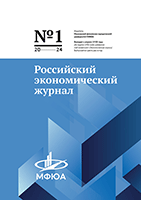Архив
Российский экономический журнал 1 / 2014
Abstracts of Main Articles
DISASTROUS RESULTS OF 2013 – YET ANOTHER PUSH FOR CHANGING ECONOMIC AND MANAGERIAL STRATEGIES
Author
Vinslav Yu.B., ScD (Economics), Prof., Vice-President, Academy of Management and Business Administration
Abstract
In ascribing the disastrous socio-economic results of 2013 in that even the slight still registered positive macrodynamics is a growth not simply «without development» but «with antidevelopment» («degradation» growth), the author treats the main reasons for that as internal and manmade ones, associated with the lack of effective management strategies at national and corporate levels. Suggestions for their application, based on the author’s multiyear expertise, constitute the positive contents of the article.
Key words
growth without development, growth with anti-development, government strategic planning, structural diversification of economy, industrial policy, socio-economic priorities, integrated corporate structures, corporate-wide strategies.
HOW TO REVERSE THE EVOLVING NEGATIVE MACROTRENDS?
Author
Grinberg R.S., Corresponding Member, RAS, Director, Institute of Economics, RAS;
Sorokin D.E., Corresponding Member, RAS, First Deputy Director, Institute of Economics, RAS
Abstract
In criticizing the passive inertial methodology of the current socio-economic forecasting, the authors insistently advise federal authorities to shape a different – optimistic, vitally needed for the country – forecast, implying turnaround of the negative trends evolving in the economy. The article justifies the main prerequisites for the turnaround, and the main assumption in their system is the termination of demonization of the state role in economy, identification and skillful involvement of its genuine modernization functions
Key words
socio-economic forecasting, forecast of socio-economic development of the Russian Federation for a period of up to 2030, manual management of economy, safety cushion, public private partnership, modernization of infrastructural and technological basis of national economy.
DESTRUCTION OF OPTIMISTIC ILLUSIONS AND STARTING POINT FOR ECONOMIC RECOVERY
Author
Delyagin M.G., ScD (Economics), Director, Institute of Globalization Problems
Abstract
Being convinced in that conservation of liberal socio-economic policy a la 1990s leads the country to stagflation and then to a full-fledged systemic crisis, the author advances his own concept of «reversing» the course of Russian «oil-and-gas Titanic». The key to economic recovery, according to this concept, is an integrated modernization of national economic infrastructure, having a considerable multiplicative effect, in the first place of rail- and motor roads, housing and public utilities
Key words
liberal socio-economic policy, corruption, arbitrary monopoly actions, inflation, safety cushions, national economic infrastructure, fifth Gaidar Forum.
EURASIA INTEGRATION: ITS PROSPECTS AND CAPACITIES
Author
Bykov A.N., ScD (Economics), chief research associate, Institute of Economics, RAS, Prof. with State University of Management
Abstract
The article sums up the author’s long studies of Eurasia integration process, identifies its opportunities and prospects, sets out recommendations on its promotion, argues approaches of its overt and covert opponents
Key words
Eurasia integration, CIS, EurAsEC, Customs Union of Byelorussia, Kazakhstan and Russia, Common Economic Space, Eurasian Economic Union, Ukraine, China, SCO, EU.
EVOLVEMENT OF EUROPEAN BANKING UNION AND «CYPRUS ANTICRISIS MODEL»
Author
Seriogina S.F., ScD (Economics), Prof., Head, Economic Theory Department of NRU HSE; Larionova M.L., PhD (Economics), assistant professor (Cyprus)
Abstract
First, the article (it starts in No. 6 of this publication for 2013) summarizes the reasons for establishing the banking union – one of the major institutional structures of the Economic and Monetary Union functioning within the frameworks of the European Union. Second, it describes the possibly ultimate structure of the evolving banking union, its components and the respective mechanism for resolving crisis situations in this area. Third, it closely studies the case of resolving the banking crisis in Cyprus, where an unprecedented, but reflecting the features of the future integration «standard», rescue approach was employed.
Key words
European Union, Economic and Monetary Union, ECB, banking union, Single Supervisory Mechanism (SSM), Single Resolution Mechanism (SRM), Bank of Cyprus, Cyprus Popular Bank (Laiki).

